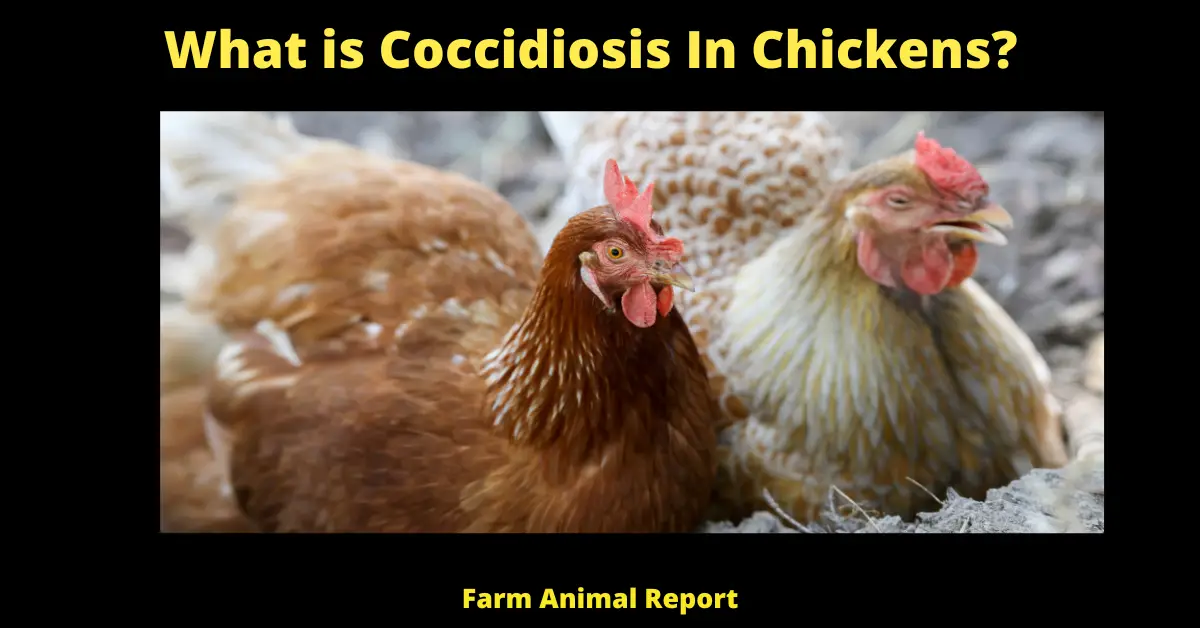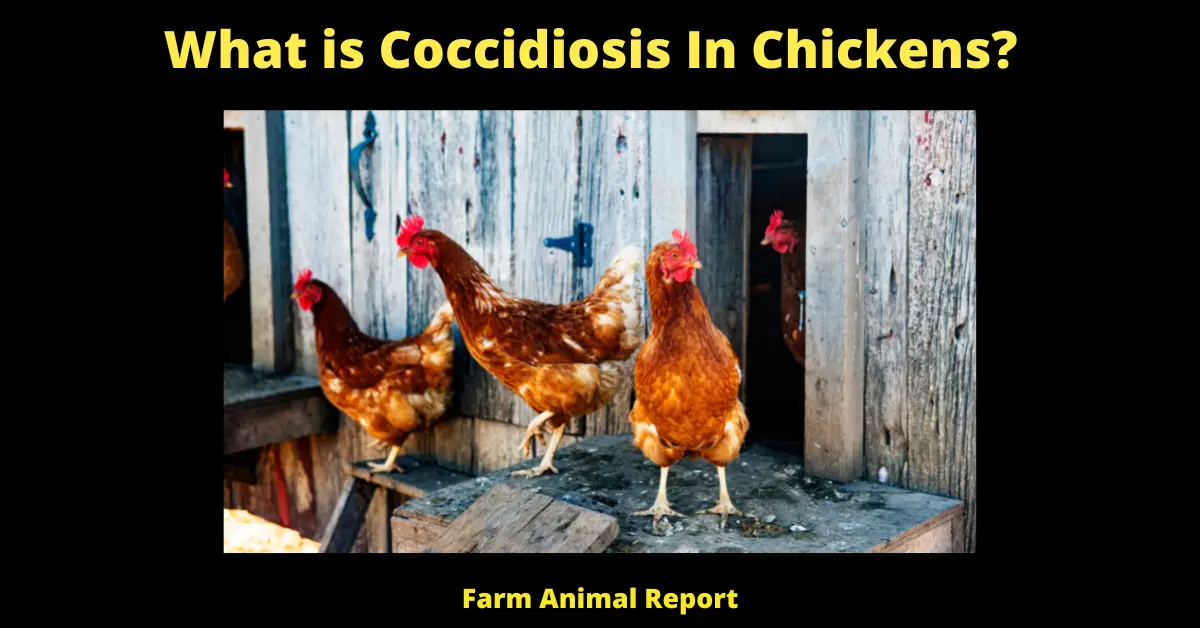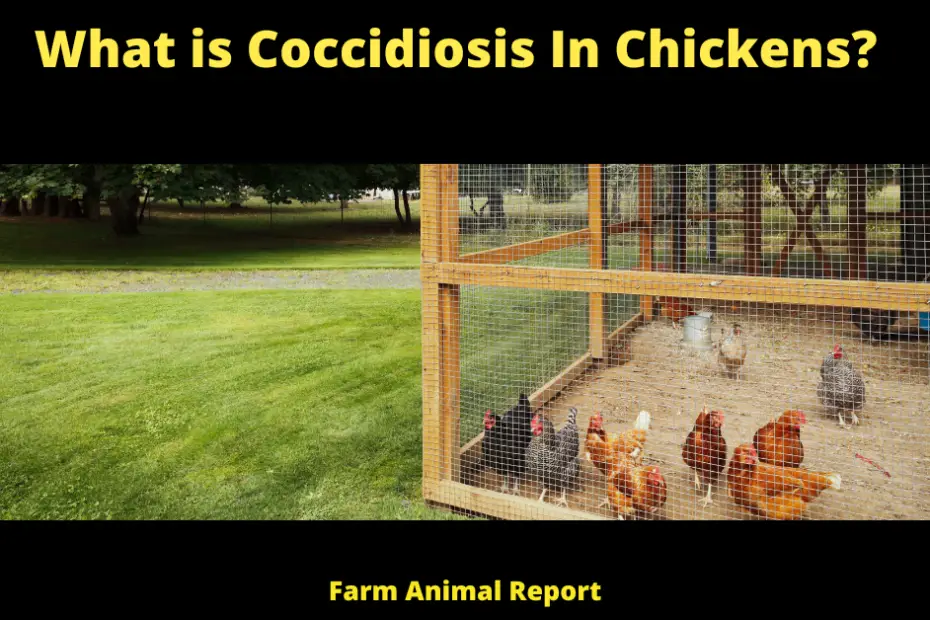What is coccidiosis and why should you be concerned about it in your chickens? Coccidiosis is a parasitic disease that can affect chickens of all ages, but young chicks are the most susceptible. In severe cases, coccidiosis can lead to death. There are several ways that you can prevent this disease in your flock, and we will discuss them in this blog post.
What is Coccidiosis In Chickens?
Coccidiosis in chickens is caused by a microscopic parasite called coccidia. The parasite lives in the chicken’s intestine and multiplies rapidly, causing damage to the intestinal lining. This can lead to bloody diarrhea, dehydration, and ultimately death.

Coccidiosis is one of the leading causes of death in young chickens, and it is easily spread from one bird to another. The best way to prevent coccidiosis is to keep chickens in clean, dry conditions and to practice good hygiene.
Chickens should be treated with coccidiostats against the disease, and any birds that show signs of illness should be immediately isolated from the rest of the flock. What is Coccidiosis In Chickens
What is the Lifecycle of the coccidia parasite that causes coccidiosis?
The coccidia parasite has a complicated lifecycle that begins when an infected animal sheds oocysts in its feces. When these oocysts are ingested by another animal, they travel to the small intestine where they undergo sporulation.
This process takes about 18 hours, and during this time the oocysts develop into infectious organisms called sporozoites. The sporozoites then infect the cells of the intestine, causing them to break down and release large amounts of fluids.
This can lead to severe dehydration and malnutrition in infected animals. In some cases, the parasite can also invade other tissues in the body, causing organ damage and death. With prompt treatment, however, most animals recover from coccidiosis without any lasting effects.
What are the symptoms of coccidiosis in chickens
Coccidiosis is a disease that affects chickens and is caused by a protozoan infection. The most common symptom of coccidiosis is bloody diarrhea, which can lead to dehydration and death in severe cases.
Chickens may also stop eating and drinking, and they may become lethargic and have difficulty walking. In some cases, coccidiosis can cause internal bleeding, which can be fatal. Treatment for coccidiosis typically includes the use of antibiotics, but affected chickens should be isolated from the rest of the flock to prevent the spread of the disease.
Prevention of coccidiosis is typically accomplished through the use of anticoccidial drugs, which are added to the chicken’s feed.
What Causes coccidiosis in Chickens?
Coccidiosis is a disease that affects chickens and other poultry. The disease is caused by a protozoan called Eimeria, which invades the chicken’s intestines and multiplies. Symptoms of coccidiosis include weight loss, diarrhea, lethargy, and death.
Chickens can become infected with coccidiosis through contaminated water or food, or by contact with other infected birds. Coccidiosis can be prevented by keeping chickens clean and free from parasites, and by providing them with fresh, clean water and food. If chickens do become infected with coccidiosis, treatment is available in the form of drugs that kill the parasites.
There are Nine Species of coccidia that can affect Chickens.
There are nine species of coccidia that can affect chickens, but only four of these species are commonly found in the United States.
The most common species is Eimeria tenella, which causes cecal coccidiosis. This disease is characterized by bloody diarrhea and weight loss, and it can be fatal in severe cases.
Chickens can also become infected with Eimeria necatrix, which causes intestinal coccidiosis. This disease is less common than cecal coccidiosis, but it can still be deadly if not treated promptly. Treatment for both of these diseases typically includes the use of antibiotics.
Chickens can also become infected with Eimeria acervulina and Eimeria brunetti, but these infections are typically mild and do not require treatment.
Prevention of coccidiosis is the best way to protect your flock, and this can be accomplished by keeping chickens clean and free from parasites, and by providing them with fresh, clean water and food.
How do Chickens get coccidiosis?
Chickens are susceptible to a disease called coccidiosis, which is caused by a protozoan parasite. These parasites invade the chicken’s gut and cause severe inflammation, resulting in bloody diarrhea, weakness, and weight loss. In some cases, coccidiosis can be deadly.
Chickens typically become infected with coccidiosis when they eat contaminated food or water. The parasites can also be spread through contact with contaminated soil or poultry manure.

Once infected, chickens can continue to shed the parasites in their feces for several weeks, contaminating their environment and increasing the risk of spreading the disease to other chickens. Fortunately, coccidiosis can be prevented with good hygiene practices and regular cleaning of chicken coops.
Vaccines are also available that can help protect chickens from this disease.
Chickens that are raised on the wire have much less chance of contamination. It is more common on chickens raised on dirt, and bedding where they can easily come in contact with contaminated feces.
How to treat coccidiosis in chickens
Coccidiosis is a common disease in chickens that is caused by parasitic protozoa of the genus Eimeria. The parasites invade the chicken’s intestine and cause severe damage, resulting in bloody diarrhea, weight loss, and death.
Treatment for coccidiosis typically involves the use of an anticoccidial drug, such as sulfadimethoxine or amprolium. These drugs work to kill the parasites and reduce the severity of the disease. In severe cases, however, coccidiosis can be fatal. As such, it is important to seek veterinary care if you suspect that your chicken may be infected.
Medicated Starter Feed for Your Backyard Chickens is what many Poultry Farmers use.
What Natural Treatments are available for coccidiosis in Chickens
Coccidiosis is caused by a species of protozoan parasites that infect the intestines of chickens. These parasites can cause severe intestinal damage, leading to diarrhea, weight loss, and even death. While there are several commercial treatments available for coccidiosis, some chicken owners prefer to use natural methods.
Garlic, for example, has been shown to have anti-parasitic properties and can be added to chicken feed. Herbs such as oregano, mint, and basil can also help to control coccidiosis. Some chicken owners also add apple cider vinegar or yogurt to their chickens’ water, as these products can help to boost the birds’ immune systems.
Ultimately, there are a variety of natural treatments available for coccidiosis, and the best method will vary depending on the individual flock.
How to prevent coccidiosis in chickens
Cocci are a type of single-celled organism that can cause disease in chickens. The most common type of coccidiosis is gastrointestinal, which leads to diarrhea, weight loss, and dehydration.
Chickens can also suffer from respiratory coccidiosis, which causes coughing and difficulty breathing. Infected chickens may also stop laying eggs. Coccidiosis is typically caused by unsanitary conditions, such as exposure to contaminated water or contact with infected feces. The best way to prevent coccidiosis is to maintain cleanliness in the chicken coop and surrounding area.
This includes regular cleaning and disinfection of the coop, as well as providing clean drinking water and collecting feces on a daily basis.
Many Farmers treat their meat birds with anticoccidial drug as a preventative measure in their water or feed. By taking these simple precautions, you can help to keep your chickens healthy and free from coccidiosis.
Can Humans catch coccidiosis from Chickens?
Coccidiosis is a disease that is caused by an infection with the coccidia parasite. Chickens are the most common host for this parasite, but it can also infect other animals, including humans. The coccidia parasite is usually spread through contact with contaminated feces, and it can cause severe diarrhea in infected individuals.
Symptoms of coccidiosis typically appear within 7-14 days after exposure to the parasite and can include watery diarrhea, blood in the stool, weight loss, and dehydration. In severe cases, coccidiosis can be fatal. Humans can catch coccidiosis from chickens, but this is relatively rare.
Most cases of human infection occur in developing countries where sanitation conditions are poor and contact with animal feces is common. Coccidiosis is treatable with antibiotics, so if you think you may have been exposed to the parasite, you should see a doctor as soon as possible.
Final Thoughts – What is Coccidiosis In Chickens?
Chickens, especially meat birds are susceptible to the parasite called Coccidiosis. This disease is caused by protozoan parasites that infect the intestines of chickens and can lead to severe intestinal damage, diarrhea, weight loss, and even death. There are several commercial treatments available for coccidiosis, as well as some natural methods. The best way to prevent coccidiosis is to maintain cleanliness in the chicken coop and surrounding area.


